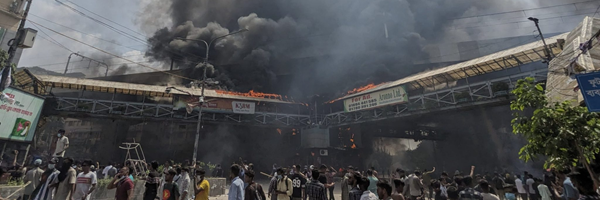Retaliatory Violence Grips Bangladesh Weeks After Hasina’s Resignation

Abdul Rahman, People’s Dispatch, August 18, 2024 —
Since Hasina stepped down on August 5, there have been increasing incidents of violence against members of her party and symbols of the Liberation War.
The commemoration in Dhaka of the assassination of Sheikh Mujibur Rahman, considered to be the founder of the nation, was marked by violent attacks. Hundreds of people had gathered in Dhaka to honor Bangladesh’s first prime minister, but were met with large-scale violence by protesters, including students. The incident comes just two weeks after Sheikh Hasina stepped down as prime minister of Bangladesh.
Those participating in the commemoration, which included members of Hasina’s Awami League, were reportedly attempting to reach Sheikh’s home but were prevented from doing so by students who also blocked journalists trying to cover the incident. “Several people were beaten up, tied up and handed over to law enforcers” by the mob of students, Bangladesh’s leading newspaper the Daily Star reported. Earlier this month, Mujibur Rahman’s house was torched by protesters.
Some analysts have said that the incident indicates the ideological orientation of certain sectors in the new interim administration which took over power after Prime Minister Sheikh Hasina resigned and left the country earlier this month.
The Workers Party of Bangladesh (WPB) has called the attack on Sheikh Mujibur Rahman’s house and other places associated with him as attacks on the symbols of Bangladeshi nationalism and condemned the failure of the interim administration to stop such attacks.
Degradation Of The Symbols Of The Liberation War
Sheikh Mujibur Rahman, the father of Hasina, was assassinated on August 15 along with all the members of his family by the country’s armed forces during a military coup in 1974, less than three years after Bangladesh was created in a bloody war of liberation with Pakistan. Hasina and her sister survived the attack on their family because they were outside the country at the time.
The date of the assassination, August 15, was declared a national holiday by Hasina’s government who was re-elected to serve a fourth term in January this year. Though she emerged victorious, criticisms were raised in light of the historically low voter turnout and boycott of the process by major opposition parties.
The interim government led by economist and Nobel prize winner Mohammad Yunus, which also includes representatives of student leaders who led the quota reform movement which ultimately was the undoing of Hasina’s rule, canceled the holiday after assuming power last week.
A report released on August 16 from the UN Office of the High Commissioner for Human Rights, detailed the events in the last month in Bangladesh and highlighted that since the resignation of Hasina, numerous retaliatory attacks have been carried out against Awami League members and offices and against religious minorities and institutions. In these attacks, scores of people including leaders of the have been killed, their houses attacked and party offices burnt.
Many have criticized that despite declaring the establishment of law and order as priority, the Yunus-led interim government has failed so far to stop the attacks.
Hasina in a message last week expressed her concerns about ongoing violence against Awami League and workers of the other parties in her country saying that “my heart cries upon receiving news that many leaders have been killed, workers are being harassed, and their homes are subjected to vandalism and arson.”
Hasina Alleges US Involvement In Uprising
Hasina also accused that the uprising against her government was orchestrated by the powers from outside the country. In a comment published in the Economic Times in India where she is currently residing after leaving her country, Hasina claimed that her government’s refusal to hand over Saint Martin Island to the US was the main reason behind the regime change plot.
“I could have remained in power if I had surrendered the sovereignty of Saint Martin Island and allowed America to hold sway over the Bay of Bengal. I beseech the people of my land, please do not be manipulated by the radicals,” Hasina stated.
Saint Martin Island is a small Island only 9 kilometers away from Bangladesh’s coast line in the Bay of Bengal. The Hasina government had claimed last year that the US had been putting pressure on her to hand over the island and had alleged that Bangladesh Nationalist Party (BNP), the main opposition party, was in touch with the US for the same.
Though the US refuted the allegations, it was not for the first time that Hasina had expressed her apprehension about US plotting against her government and had done so in a speech in the country’s parliament in April itself. In late July, she and the Awami League had also reiterated the allegations of external involvement during the first round of violence in the quota reform protests when close to 200 people were killed.
Hasina, her party and some of the left groups in the country had alleged that extremist groups such as Jamaat-e-Islami and its student wing Chhatra Shibir had used the quota agitation to force a regime change under the instructions of external forces.
M K Bhadrakumar, a retired Indian diplomat concurred with Hasina’s claims about the US involvement in her removal. “From the American perspective, Bangladesh is a priority country for ‘democratization’ and a lynchpin of the US’ Indo-Pacific strategy. Washington has been exerting pressure on Hasina to bandwagon. Hasina’s stubborn refusal to join Quad was probably the clincher,” he wrote.
Quad (Quadrilateral Security Dialogue) is an US led alliance involving India, Japan and Austria. Originally formed in 2007 it has been revived recently primarily as a tool to execute anti-China policies in the Indo-Pacific region.
